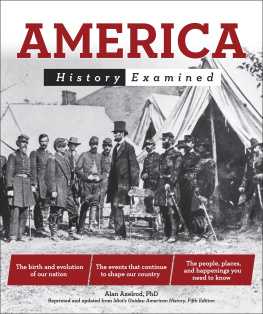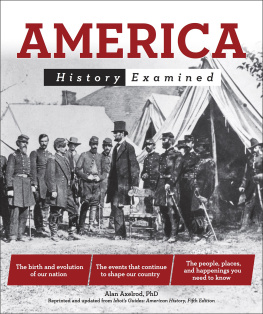Publisher: Mike Sanders
Senior Acquisitions Editor: Janette Lynn
Cover Designer: Rebecca Batchelor
Book Designer/Layout: Ayanna Lacey
Copy Editor/Proofreader: Laura Caddell
Indexer: Brad Herriman
Published by Penguin Random House LLC
001-312950-JANUARY2019
Copyright 2018 by Alan Axelrod, PhD
All rights reserved. No part of this book may be reproduced, scanned, or distributed in any printed or electronic form without permission. Please do not participate in or encourage piracy of copyrighted materials in violation of the authors rights. Purchase only authorized editions. No patent liability is assumed with respect to the use of the information contained herein. Although every precaution has been taken in the preparation of this book, the publisher and author assume no responsibility for errors or omissions. Neither is any liability assumed for damages resulting from the use of information contained herein. For information, address Alpha Books, 6081 E. 82nd Street, Indianapolis, IN 46250.
eISBN: 9781465487001
Library of Congress Catalog Card Number: 2018952587
Note: This publication contains the opinions and ideas of its author. It is intended to provide helpful and informative material on the subject matter covered. It is sold with the understanding that the author and publisher are not engaged in rendering professional services in the book. If the reader requires personal assistance or advice, a competent professional should be consulted. The author and publisher specifically disclaim any responsibility for any liability, loss, or risk, personal or otherwise, which is incurred as a consequence, directly or indirectly, of the use and application of any of the contents of this book.
Most Alpha books are available at special quantity discounts for bulk purchases for sales promotions, premiums, fund-raising, or educational use. Special books, or book excerpts, can also be created to fit specific needs. For details, write: Special Markets, Alpha Books, 345 Hudson Street, New York, NY 10014.
Trademarks: All terms mentioned in this book that are known to be or are suspected of being trademarks or service marks have been appropriately capitalized. Alpha Books and Penguin Random House LLC cannot attest to the accuracy of this information. Use of a term in this book should not be regarded as affecting the validity of any trademark or service mark.
Reprinted from The Complete Idiots Guide to American History, Fifth Edition
As ever, for Anita.
Introduction
Most of the worlds nations are places places with a past, certainly, and with traditions and a heritage, but places nevertheless. The United States is different. Its a place, but its also an idea . Sure, democracy was not exactly a new idea in 1776the word democracy, meaning government by the people, was coined in ancient Greecebut no one had really tried it before. Few people thought it would work.
The story of gambling on an untried notion is bound to be fascinating. When you have a stake in that gamble, the story can be downright riveting. My purpose is to give you a rapid but comprehensive overview of American history. Obviously, a book of this length is also grossly incomplete. Search online for books on American history, and you will be swept away in a tsunami of titles. The great thing is that so many of them are worth reading. Like a roadmap, this book doesnt show you everything and everyone. But its a great way to start your journey through the American story.
, takes us back maybe forty some thousand years (nobody is sure how far back to go) to the epoch of the first immigrants, the people who crossed the long-vanished Bering land bridge from Asia to North America. The discussion then shifts to the collision of Old World and New as Europe invaded the Native American realm beginning in the fifteenth century, transforming the continent into a battlefield on which a nation was forged.
, covers the American Revolution, from origins to outcome, including issues of economic, political, and spiritual independence.
, discusses the creation of the Constitution, the War of 1812, the rise of Andrew Jackson, and the era of the common man, as well as the forced removal of the Indians from the East to the West.
, analyzes the causes of the Civil War, the early steps toward western expansionincluding the U.S.-Mexican War, by which much of the present U.S. Southwest was acquiredthe Civil War itself, and the Reconstruction era following it.
, covers the major period of western expansion, including the homestead movement, the building of the transcontinental railroad, the Indian Wars, the growth of the western cattle empire, and the economic and technological boom of the later nineteenth century. This part also discusses the immigrant experience, the labor movement, and the rise of urban political machines.
, charts the nations evolution as a world power (beginning with the Spanish-American War and World War I), the isolationist reaction against that evolution, the culture of the Roaring Twenties (including the heyday of Prohibition Era gangsters), the stock market crash, and the Great Depression. This part also outlines the origins of World War II and the nations fight to victory in that war, from which it emerged as a nuclear superpower.
, covers the Cold War years, the Korean War, the Civil Rights movement, and the social revolution wrought during the administrations of John F. Kennedy and Lyndon Johnson. This part concludes with the Vietnam War.
, surveys the turbulent home front during the Vietnam era, including such highs as the Apollo 11 moon landing and such lows as the Watergate scandal. The womens liberation movement is also discussed, as are the energy crisis and the economic crises of American cities and industry, which created fertile ground for the growth of Reaganomics.
, begins with the Reagan years and covers the end of the Cold War, including the experience of the first Gulf War. The final three chapters in this part look at recent events, including: the terrorist attacks on the United States; the wars in Iraq and Afghanistan; the financial and ethical collapse of some major corporations; challenges to the economy and the environment; the division of the nation into red states and blue states; the troubled presidency of George W. Bush; the election of 2008, which brought the United States its first African-American president; and the open question that is the election and presidency of Donald J. Trump.
Extras
In addition to the main narrative of America: History Examined, youll find other types of useful information, including capsule histories of major events, brief biographies of key people in American history, digests of important statistics, and quick definitions of historical buzzwords. Look for these features:
AMERICAN ECHO
These are memorable statements from historically significant figures and documents.
AMERICAN LIFE
This feature provides biographical sketches of an eras most significant and representative figures.
This feature defines the buzzwords that defined a time and place.
Here youll find key numbers relating to an era or event, including such items as population statistics, war casualties, costs, and so on.
















